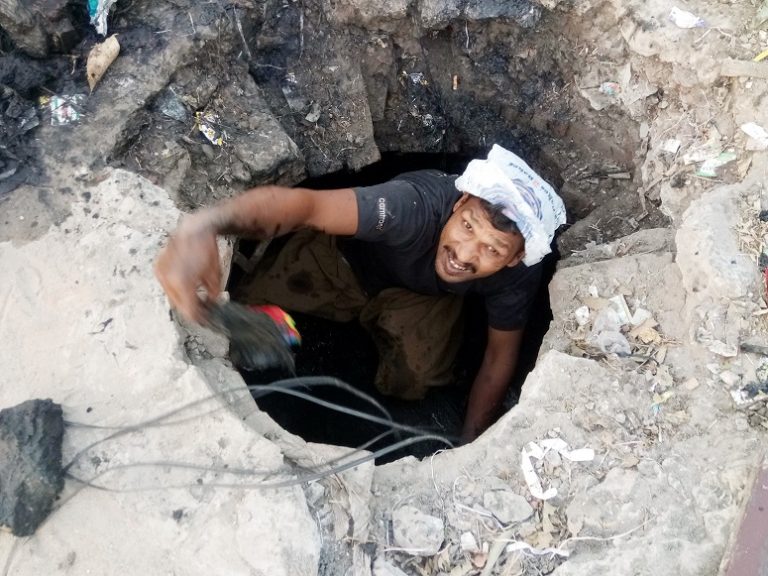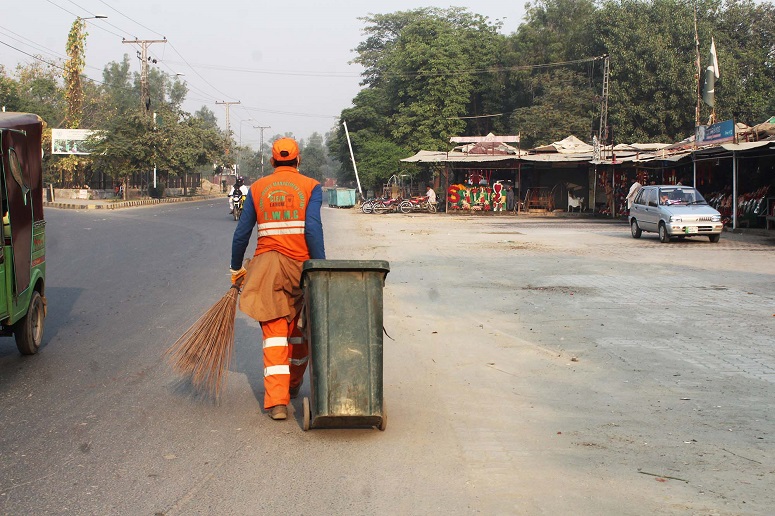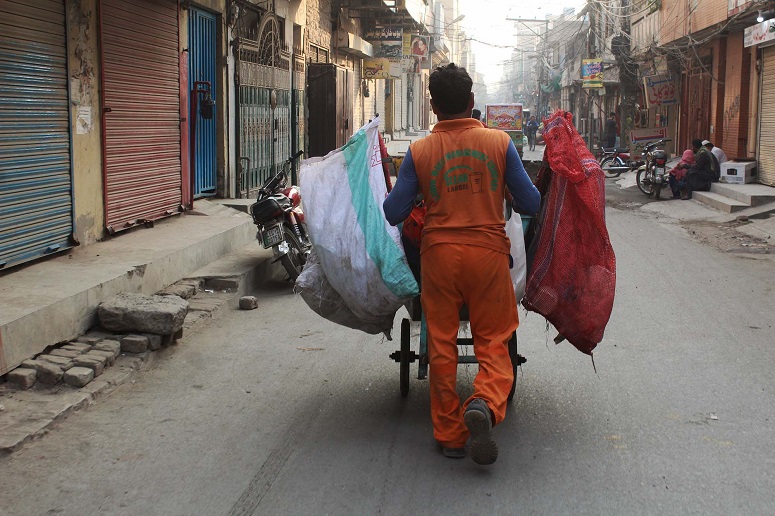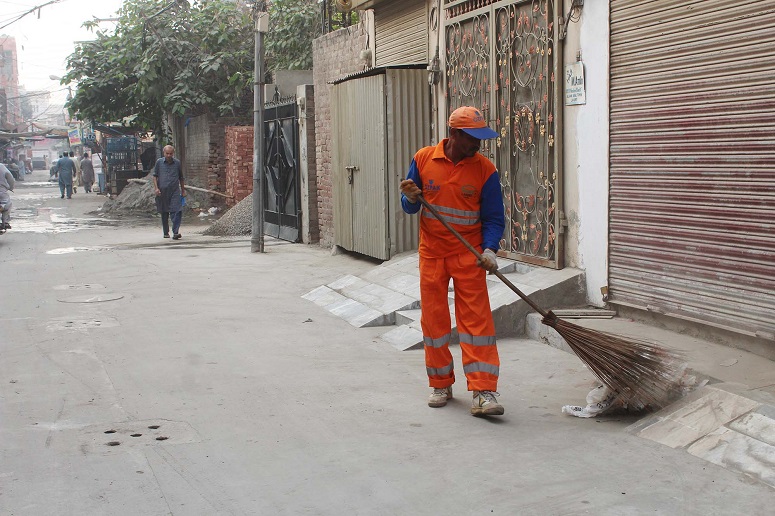
Their families converted in the late 19th to early 20th centuries in the villages of what is now the central Punjab of Pakistan. This “untouchable” caste status is at the root of several blasphemy charges against Christians.
Situation remains unchanged even after 75 years
By Asif Aqeel
Asia Bibi was on death row for blasphemy, after offering drinking water which she, as a Christian, was considered to have made “unclean” by her touch. She got into an argument over this.
Many Pakistani Christians – who are about 2% of the population – are children of converts to Christianity from the downtrodden “untouchable” Hindu tribal caste – they are sometimes called “chuhra” (a modern equivalent might be something like “toilet cleaner”). Their families converted in the late 19th to early 20th centuries in the villages of what is now the central Punjab of Pakistan. This “untouchable” caste status is at the root of several blasphemy charges against Christians.
Also synonymous with “low born”, “filthy”, “deprived of morals and values”, of “low intellect”, and condemned to suffer for sinful past incarnations is their expected work as “sweepers”, also known as “janitors” in the Indian subcontinent.
Why do so many Christians sweep?
At the time of partition of the Indian subcontinent into India and Pakistan in 1947, hundreds of thousands of people crossed the newly created borders. Before partition, most Christians worked the land for their Sikh agricultural landlords.
At partition, Hindus and Sikhs left for India and Muslims left for Pakistan. At least 50,000 Christian families were rendered jobless in Pakistani Punjab after the lands evacuated by Sikhs were given to Muslim migrants. These laborers had no choice but to seek employment in cities in whatever occupation was available.
Five years ago, World Watch Monitor reported on the disproportionate number of Pakistani Christians in sewerage or sanitary work, or sweeping the streets. These roles, hazardous for health, and sometimes causing death, are considered demeaning for Muslims. Sanitary workers, mostly illiterate, also often live in illegal settlements that lack basic amenities.
Recently World Watch Monitor learned that, as a direct result of that report, the law on recruitment policies was actually changed in the Punjab, where most Christians live.
 Punjab removes ‘only Christian’ sewerage workers policy
Punjab removes ‘only Christian’ sewerage workers policy
In September 2015, an advertisement by the Punjab Institute of Cardiology of sanitation job vacancies requiring only “non-Muslims” to apply, based on the Health Department’s Service Rules of 2003, drew huge criticism.
“By-elections were going on in a constituency of pivotal importance in Lahore, and Christians’ vote could play a decisive role. In a high-profile, closed-door meeting, then-Punjab parliamentarian Mary Gill raised the Christian community’s anger with then-Chief Minister Shahbaz Sharif. “Mr. Sharif ordered to revoke such a policy,” then-Parliamentary Secretary for Health, Khawaja Imran Nazir, told World Watch Monitor. “As I was Health Minister, so the lot fell to me, which was passed on to the Strategic Reforms Unit [a government think-tank] to carefully review.”
Salman Sufi, who led the think-tank, explained: “The basic reason for creating the unit was to address issues of marginalized sections of society, including religious minorities.
“When this came up, we discussed it with minority parliamentarians, including Mary Gill, and Christian clergy. On one hand, many among the Muslim majority believe it’s a duty of Christians to work as janitors and, on the other, many Christians had internalized that it was their lot and nothing could change.
“It was a red alert as to why very few Christians were scientists or educationists and a disproportionate number were in janitorial work.
“The Unit discussed with several secretaries of government departments and then, on behalf of the Chief Minister, contacted the then-Chief Secretary, who issued a notice to strike out this policy.
“In this entire work, the World Watch Monitor story helped members of the Unit understand the background and reasons why this discriminatory policy existed in the first place. That’s why, when the Unit issued a press release, it clearly referred to World Watch Monitor’s story.”
Since then, this trend has decreased in the province of Punjab. However, in other provinces, it is still common for advertisements for street sweepers or sewage cleaners to request only “non-Muslim” applicants.
 ‘Non-Muslims’, or just Christians need apply?
‘Non-Muslims’, or just Christians need apply?
World Watch Monitor’s article came out when the current federal defence minister, Pervez Khattak, then Chief Minister of Khyber Pakhtunkhwa province, publicly stated that “non-Muslims will be recruited as sweepers”.
Although “non-Muslim” means Hindus, Sikhs, Zoroastrians or any other minority, it was only Pakistani Christians who angrily protested and held social-media campaigns. The reason was obvious: it actually meant “only Christians” because, across the country, it is only the Christian community which has a disproportionately high representation because of their origins in the “untouchable” caste designated to this occupation.
Several advertisements clearly state they require a “Christian” (or a “scheduled-caste” Hindu) for the work of “janitor”.
On 26 August this year in Sindh, the Rangers, a paramilitary force under the Pakistan Army, advertised for only “non-Muslims” to apply for the job of janitors.
Three days later, the education department of the province of Khyber Pakhtunkhwa advertised that candidates for the job of “sweeper” must be “healthy” and “Christian” by faith.
Similarly, an advertisement earlier this year for a college hospital in Sindh province required that those applying for janitorial work should be a “scheduled-caste” Hindu or member of another minority.
In July 2017, the Hyderabad Municipal Corporation required applicants for the janitorial service “to take an oath on their religious holy book – Geeta or Bible – that they will never do anything else but work as a sanitary worker, and will never refuse to carry out the work”.
And in March 2017, Bannu Tehsil Municipal Administration advertised jobs for sweepers, saying “Shi’as, Hindus/Balmikis, and Christians will be eligible”, though the administration quickly retracted it, saying the mention of “Shi’a” was a typographical mistake.
Disproportionate representation of Christians
World Watch Monitor’s 2013 survey of Pakistani cities showed Christians were disproportionately represented in janitorial work, especially in the larger ones. Recent data shows things have not changed much.
Lahore
Capital of Punjab, largest province and home to most of the Christian population.
68% of total workforce directly employed to clean the city (12,687) are Christian (8,628).
(Data provided by Lahore Waste Management Company)
Water and Sanitation Agency
70% of c.5000 employees are Christian (3,500).
A WSA employee, on condition of anonymity, told World Watch Monitor that Muslim employees would never dive into a clogged manhole: “It is always and in every case the responsibility of a Christian.”
University of Punjab
The largest provincial institution of higher learning. Roles of Christian workers (January 2009-November 2015):
Staff nurse 1
Technician 1
Sewer man (janitor) 2
Coolie (loader) 1
Sanitary Worker 76
Research Scholar 1
Electric Coolie 1
Software Engineer 1
Mali (gardener) 5
Naib Qasid (low-level office “runner”) 2
Junior Clerk 1
Junior KPO 1
Laboratory supervisor 1
Laboratory attendant 1
Driver (tractor) in Sanitation Wing 1
Driver (transport wing) 1
Total 97
Islamabad
Pakistan’s capital, population of just over 1 million.
The Capital Development Authority has about 2,700 workers in sewage cleaning and garbage collection. Almost all of them are Christian.
Data from the Capital Administration Department shows the total number of non-Muslim employees is 500 – again almost all of whom are Christian.
Public service ranking starts grade 1, ends at grade 22 (for all heads of department including the President).
Eleven Ahmadi employees are all on the high-scale income (grades 14 to 18).
There are four Hindus: two are grade 18 and two grade 17.
Of the Christians, 448 are at the lowest-income grade (1). Of the remaining 37, one is grade 2, three grade 7, one grade 9, 12 grade 14, nine grade 16, eight grade 17 and three grade 18.
Karachi
Capital of Sindh province, c.20 million population
Sindh is the main hub of the Hindu community, but Christians are the largest minority in Karachi.
“The number of sanitation workers is decreasing. Firstly, people hate to join this profession, and, secondly, the nature of work is slowly changing from labor-intensive to technology-intensive.
“Of roughly 17,000 sanitation workers, about 80% are Christian. Some work has been outsourced to a Chinese company that employed Afghan refugees, but collecting garbage is still mostly for our Christian fellows.
“There are a good number of scheduled-caste Hindus in this occupation, but in Karachi they prefer to work in banks, schools, universities etc., not in the municipal corporation.”
(Syed Zulfiqar Shah, All Pakistan Local Government Workers’ Federation President)
Hyderabad
Second city in Sindh, population c.1.7 million, can be considered as capital of interior Sindh.
Hyderabad Municipal Corporation
“Of 150 sewage workers, 143 are Christian, seven are scheduled-caste Hindus. Similarly for waste management, of about 1,900 sanitary workers, about 1,500 are Christian.
“Others are scheduled-caste Valmiki Hindus, particularly of Gujarati origin, and Muslims.
“But it is mainly the Christians who work and bear the entire suffering and hardship.”
(Butta Imtiaz, human rights activist)
Muzaffarabad
Capital of Azad Jammu and Kashmir, self-governing polity administered by Pakistan.
Municipal Corporation of Muzaffarabad
“Of about 275 workers, 17 are Christian; most of the 33 Christian families living in this city are related to the occupation of janitor.”
(Sonia Riast, social activist)
Quetta
Capital of Baluchistan province. Christians are the main religious minority
Quetta Municipal Corporation
“Of around 978 workers, about 550 are Christian.”
(Local source, on condition of anonymity)
Peshawar
Capital of Khyber Pakhtunkhwa province. Christians are the main religious minority
C.5000 employees in the janitorial profession; c.3500 (70%) are Christian.
Gilgit
Capital of Gilgit-Baltistan since 2009, borders Xinjiang, China.
Gilgit Waste Management Company and other departments have c.330 workers.
“Several Christian families live in the city of Gilgit, they came from Punjab several decades ago.”
(Israruddin Israr, Human Rights Commission of Pakistan)
“Those who work in the day are local Muslim youths, but those who collect garbage at night, until 2am, are all Christian…Christians work as janitors in several government and private departments and institutions. They are present in all 10 districts and their presence in Gilgit-Baltistan is associated with janitorial work.”
(Muzhar Mughal, local journalist)
 Discrimination against Christians or Muslims?
Discrimination against Christians or Muslims?
Article 27 (1) of the Constitution of Pakistan:
“No citizen otherwise qualified for appointment in the service of Pakistan shall be discriminated against in respect of any such appointment on the ground only of race, religion, caste, sex, residence or place of birth.”
So, technically, advertisements for only “non-Muslims” discriminate against Muslims.
A lawyer, Asad Jamal, told World Watch Monitor that a few months ago a young Muslim came to him. He had applied to the Pakistan Railways for the job of sanitary worker but was refused and told the job was only for a non-Muslim. He wanted to file a case against this “discriminatory” act of the state.
But in reality, due to the stigma of the profession, the few Muslims who do janitorial work have a reputation for opting out of the dirtiest aspects of the job. A local English-language newspaper reported in 2016 that the “appointment of Muslims as sweepers on a political basis has been badly affecting cleanliness at the public-sector hospitals of [Khyber Pakhtunkhwa] province as most of them think it against their status to brush latrines”.
No returns for huge labor
Hazards of sewerage work include direct contact with hepatitis, smallpox, rabies, influenza, measles, mumps, rubella, tetanus and tuberculosis.
Data by the Lahore Waste Management Company shows 250 have died while cleaning sewers, while according to the Minority Rights Commission, at least 70 people have died since 1988 while cleaning manholes, due to inhaling poisonous gasses.
On top of all this, such workers have no job guarantees. They are hardly regularized, nor given benefits like social welfare, health insurance, or pensions. And above all, no self-esteem, no good salary and no hope for a better future.
______________________
Courtesy: World Watch Monitor (Posted on November 1, 2018)